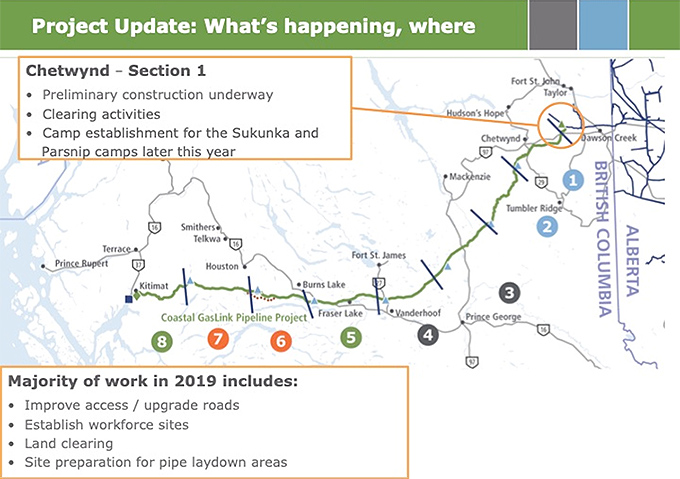Members of a B.C. First Nation opposed to a natural gas pipeline planned in their traditional territory are planning a new camp to block construction.

In a message posted to Facebook on Monday, members of the Likhts’amisyu Clan of the Wet’Suwet’en First Nation announced they would be “asserting their sovereignty by creating a new, permanent land reclamation on their territory” later in April.
WATCH: First Nations anti-pipeline blockade over for now

The camp would be the latest built on Wet’Suwet’en territory in opposition to the pipeline.
READ MORE: Wet’suwet’en to open anti-pipeline checkpoint after negotiations with RCMP, say ‘this is not over’
Back in January, RCMP arrested 14 people at a blockade built by the Gidumt’en Clan as police enforced a B.C. Supreme Court injunction granting Coastal GasLink (CGL) the right to continue preparatory pipeline work.

Get breaking National news
Shortly afterwards Wet’suwet’en hereditary chiefs announced a negotiated deal with police to open a checkpoint gate at a the 10-year-old Unist’ot’en Healing Camp, but vowed the dispute was not over.
“It is important that people realize that this fight is far from over. The events of December and January should be regarded as one phase in a struggle that has been going on for a decade,” wrote the Likhts’amisyu Clan on Monday.
“A new phase of struggle will begin in the Spring of this year, and it may prove to be the decisive one.”
The post goes on to outline a strategy to “stymie CGL by blocking them at multiple points,” including the new camp, which would be “strategically located in order to impede the ability of the Coastal GasLink corporation to force their pipeline through Wet’suwet’en land.”
The post calls for volunteers to build the camp beginning April 28, which it says will be led by warrior chiefs Dsahayl and Smolgelgem — also known as Warner Naziel — who was a key architect of the Unist’ot’en camp.
READ MORE: B.C. Premier John Horgan expecting ‘peaceful resolution’ to natural gas pipeline protest
On Friday, Coatal GasLink provided a construction update on the pipeline, which would run from northeastern B.C. to a proposed $40-billion export terminal in Kitimat.
It says preparatory for future work camps in the Chetwynd area has begun, with mainline construction planned for 2020.

TransCanada Corp. says it has signed benefit-sharing agreements with the elected councils of all 20 First Nations along the pipeline route.
“We continue to work collaboratively with Indigenous communities to ensure the pipeline is built in an environmentally sustainable manner that ensures First Nation members, businesses and local communities maximize their economic opportunities,” said the company in a statement.
However, opponents argue that elected councils’ authority is restricted to on-reservation matters, while hereditary chiefs have responsibility for traditional territory.
— With files form the Canadian Press








Comments
Want to discuss? Please read our Commenting Policy first.